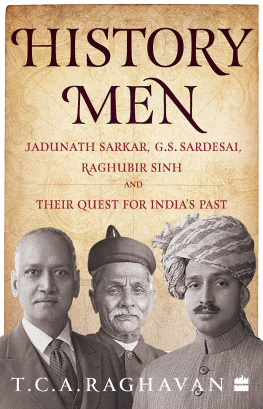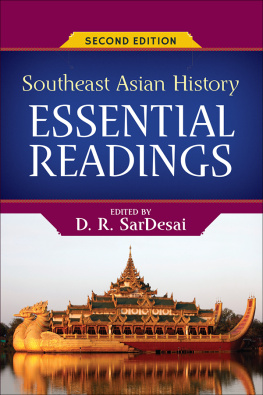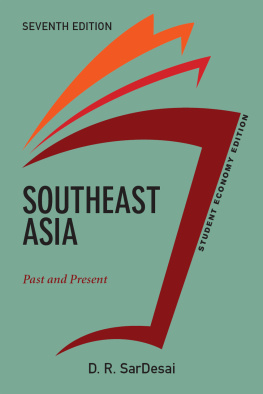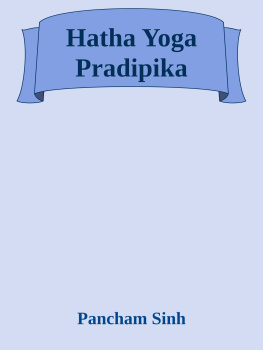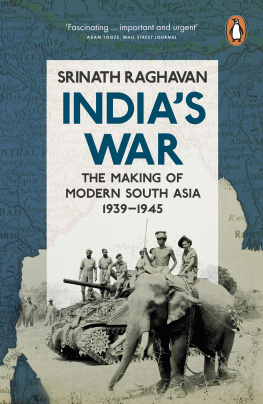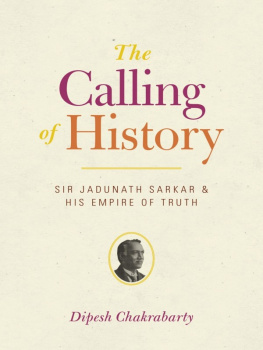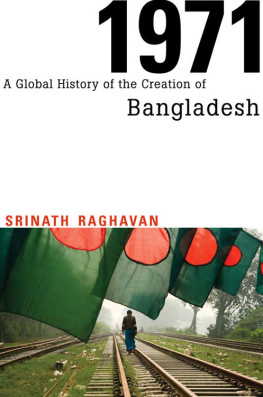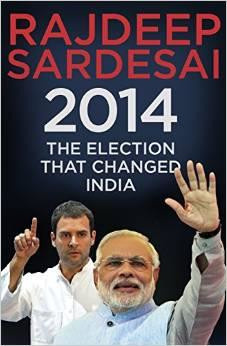T. C. A. Raghavan - History Men: Jadunath Sarkar, G.S. Sardesai, Raghubir Sinh and Their Quest for Indias Past
Here you can read online T. C. A. Raghavan - History Men: Jadunath Sarkar, G.S. Sardesai, Raghubir Sinh and Their Quest for Indias Past full text of the book (entire story) in english for free. Download pdf and epub, get meaning, cover and reviews about this ebook. year: 2020, publisher: HarperCollins, genre: Religion. Description of the work, (preface) as well as reviews are available. Best literature library LitArk.com created for fans of good reading and offers a wide selection of genres:
Romance novel
Science fiction
Adventure
Detective
Science
History
Home and family
Prose
Art
Politics
Computer
Non-fiction
Religion
Business
Children
Humor
Choose a favorite category and find really read worthwhile books. Enjoy immersion in the world of imagination, feel the emotions of the characters or learn something new for yourself, make an fascinating discovery.
- Book:History Men: Jadunath Sarkar, G.S. Sardesai, Raghubir Sinh and Their Quest for Indias Past
- Author:
- Publisher:HarperCollins
- Genre:
- Year:2020
- Rating:3 / 5
- Favourites:Add to favourites
- Your mark:
- 60
- 1
- 2
- 3
- 4
- 5
History Men: Jadunath Sarkar, G.S. Sardesai, Raghubir Sinh and Their Quest for Indias Past: summary, description and annotation
We offer to read an annotation, description, summary or preface (depends on what the author of the book "History Men: Jadunath Sarkar, G.S. Sardesai, Raghubir Sinh and Their Quest for Indias Past" wrote himself). If you haven't found the necessary information about the book — write in the comments, we will try to find it.
T. C. A. Raghavan: author's other books
Who wrote History Men: Jadunath Sarkar, G.S. Sardesai, Raghubir Sinh and Their Quest for Indias Past? Find out the surname, the name of the author of the book and a list of all author's works by series.
History Men: Jadunath Sarkar, G.S. Sardesai, Raghubir Sinh and Their Quest for Indias Past — read online for free the complete book (whole text) full work
Below is the text of the book, divided by pages. System saving the place of the last page read, allows you to conveniently read the book "History Men: Jadunath Sarkar, G.S. Sardesai, Raghubir Sinh and Their Quest for Indias Past" online for free, without having to search again every time where you left off. Put a bookmark, and you can go to the page where you finished reading at any time.
Font size:
Interval:
Bookmark:
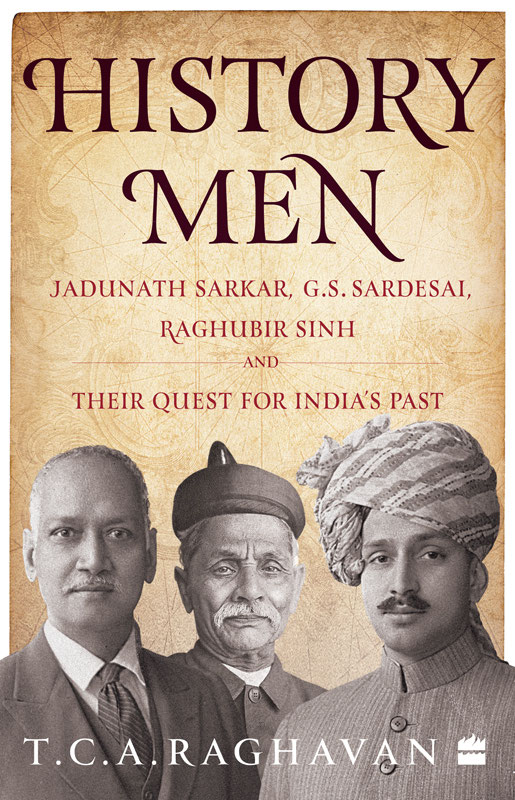
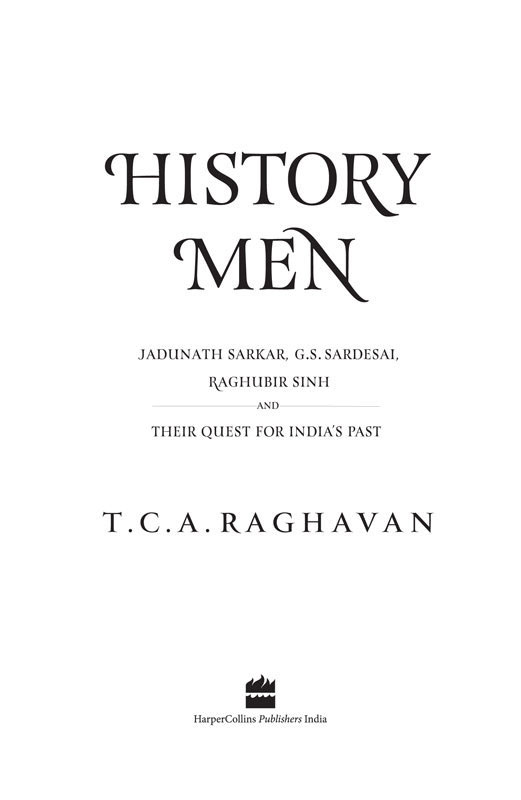
For
Pallavi and Antara
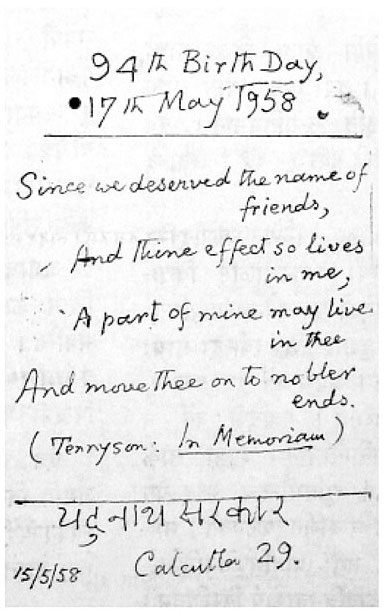
Facsimile of Jadunath Sarkars birthday greetings to G.S. Sardesai.

ON 15 May 1958, an eightyeightyearold Jadunath Sarkar in Calcutta wrote the following lines from the English poet Tennyson to G.S. Sardesai in Kamshet, a small village near Poona. The occasion was Sardesais forthcoming ninetyfourth birthday on 17 May.
Since we deserved the name of friends,
And thine effect so lives in me,
A part of mine may live in thee
And move thee on to nobler ends.
Sarkar died at his home in Calcutta after four days and G.S. Sardesai a year and a half later.
Their friendship and association had extended over half a century beginning when both were relatively obscure scholars (and few would have even termed Sardesai a historian in the early twentieth century) and continuing into the 1950s when both, in differing measures and from different quarters, were regarded as sagehistorianscholars of their times.
The correspondence between Jadunath Sarkar and G.S. Sardesai began in 1904 following an introduction through Gopal Rao Deodhar who suggested that their association would be mutually beneficial: to Sarkar for Maratha documents and to Sardesai for Persian and Mughal sources. Sardesai was later to relate how Deodhar encountered Sarkar by chance sweating over the Persian manuscripts of the Khuda Baksh Library and incidentally mentioned me [i.e., G.S. Sardesai] and my work to him. Recalling the first letter he had received from Sarkar some half a century earlier he said: Sometime in the year 1904 a letter in an unknown handwriting indicating vigour and precision and with contents securely formal and businesslike, took me by surprise at Baroda. The name of the writer did not solve the mystery as I had not till then heard of him. What the letter offered was a honourable bargain: that Sardesai supplement Sarkars considerable Persian collections with Maratha sources. This was, Sardesai recollected, like a divine windfall as he himself was feeling the need for Persian sources and did not know Persian. In short, the letter became, the pledge of future cooperation between the Mughal and the Maratha.
Sarkar and Sardesai met for the first time in 1909. The occasion was a Maratha Literary Conference organized by the princely state of Baroda. Sardesai was the secretary of the conference and had the long sought opportunity to meet and know at close quarters Jadunath after four years acquaintance through correspondence. Sardesai wrote later that the Baroda conference gave him an All India Outlook in letters and a more valuable acquaintance, namely, Jadunaths personal friendship. The Baroda meeting went well since we have letters exchanged soon thereafter describing time spent together. In November 1909 Sarkar wrote: You may come here and pass a week with me The shortest route would be BarodaRatlamUjjainBhopalItarsiJubbulpurAllahabadMughal SaraiBankipore. The two met regularly at least once every year afterwards for the next four decades and in between these meetings, as Sardesai wrote, We have built a historic bridge of letters concealed as yet from any fifth eye. The frailty of old age prevented meetings thereafter but the correspondence continued till Sarkars death.
The third figure in this triad is Maharajkumar Raghubir Sinh, scion and heir to the throne of the small princely state of Sitamau in central India. Born in 1908, he came to Sarkars and subsequently G.S. Sardesais attention on account of his research that culminated in his thesis submitted to the Agra University in 1936 titled Malwa in Transition or a Century of Anarchy (16981766). Raghubir Sinh was introduced to Sarkar by Dr J.C. Taluqdar of St Johns College, Agra, as a possible D. Litt student. Sarkar does not appear to have required much persuasion the idea of having a Rajput scion with a serious interest in history as a student would have been appealing. The heir to a princely state wanting to write a serious research dissertation was certainly unusual for the time. Despite the almost fortyyear age gap between them, a close relationship developed between the two. The association continued for the next three decades as the younger man, nurtured and encouraged by Sarkar, was admitted into a small but elite circle of his former students who now comprised some of north and eastern Indias bestknown historians. I am very glad indeed, wrote Sarkar to Raghubir Sinh in September 1933, to learn that you intend to continue your historical researches. It will be no trouble to me, but a pleasure rather, to render you any assistance in my power.
Raghubir Sinh was by no means the best known of J.N. Sarkars many students, but he was clearly one of his favourites. He was also one of the few who combined a keen interest in historical research with a public career not directly related to research or teaching history. In 1936, Sarkar forwarding his report on Raghubir Sinhs thesis Malwa in Transition, wrote to Sardesai: The candidates work gives me much hope of his future, as a worthy recruit to our campaign of sound historical research. G.S. Sardesai and the English historian P.E. Roberts were the other examiners of Raghubir Sinhs thesis.
Historian K.R. Qanungo, Sarkars seniormost student, was later to write: One of the greatest services rendered by Sir Jadunath to the cause of historical research is to pick up a Dara Shukoh from among the common run of Murads of the decadent ruling houses of Hindustan. This prince is Maharaj Kumar Raghubir Sinh of Sitamau. Dr Raghubir Sinh spent almost his whole fortune like Dara in building up a splendid research library at Sitamau. Raghubir Sinh was soon to graduate from his status as a student of Sarkar to an equal participant in his and Sardesais endeavours. As his mentors aged and their influence declined he was to emerge as the person who would carry their legacy forward and complete tasks they had left unfinished. Till his death in 1991 he was a devoted researcher and a prolific writer but best known as the prince who became a historian.
What animates this unusual trio, this triadic association of shared research interests, a commitment to writing history accurately and a close supportive friendship, is also their long, fascinating and detailed correspondence. Almost from the very beginning both Sarkar and Sardesai, perhaps independently of each other, decided to retain their letters and a substantially full record survives. Raghubir Sinh kept all the letters Sarkar and Sardesai wrote to him for a quarter of a century from about 1933 till they died in May 1958 and November 1959 respectively. Raghubir Sinh outlived them by over three decades, he died in February 1991.
Their correspondence concentrates primarily on the seventeenth and eighteenth centuries as each scholar explored his personal interest: Rajput and Malwa history in the broad context of the MarathaMughal interface in central India in the case of Raghubir Sinh; Maratha ascendance and decline in the case of Sardesai. Sarkar explored both these along with other issues including the historical drama in the life of Aurangzeb and Shivaji and the grand theme of the fall of the Mughal Empire and the simultaneous decline of other Indian powers during the eighteenth century. All three had a voracious appetite for unearthing hidden facets of history and a nearobsession with establishing factually correct chronology through primary sources. The quest for different documentary sources predominates as a unifying theme in all the letters but there are other themes also advancing historical scholarship through mutual support, friendship and loyalty.
Font size:
Interval:
Bookmark:
Similar books «History Men: Jadunath Sarkar, G.S. Sardesai, Raghubir Sinh and Their Quest for Indias Past»
Look at similar books to History Men: Jadunath Sarkar, G.S. Sardesai, Raghubir Sinh and Their Quest for Indias Past. We have selected literature similar in name and meaning in the hope of providing readers with more options to find new, interesting, not yet read works.
Discussion, reviews of the book History Men: Jadunath Sarkar, G.S. Sardesai, Raghubir Sinh and Their Quest for Indias Past and just readers' own opinions. Leave your comments, write what you think about the work, its meaning or the main characters. Specify what exactly you liked and what you didn't like, and why you think so.

